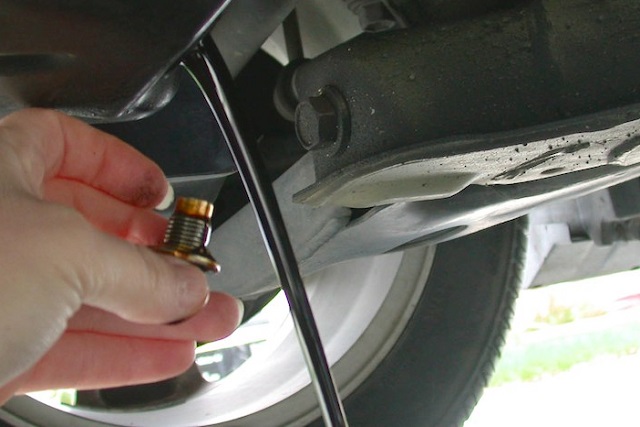So, you decided to become a DIY-er and change your motor oil yourself. And because you followed our guide, you completed the task flawlessly. But now you have a pan filled with used oil and no idea what to do with it. Fear not. Here’s how to properly dispose of motor oil.
Collecting Used Motor Oil
After you’ve changed your motor oil, you’ll be left with the aforementioned pan full of used oil. Some pans can be sealed shut, which makes the job easier. Otherwise, you’ll have to transfer the used oil into another container. Use the same container the oil came in if you still have it around. Otherwise, you should use a container made of polyethylene or a similar type of plastic. The container should also have never been used before. Oil that has been mixed with other fluids, such as gasoline, washer fluid, antifreeze and even water, cannot be recycled.
Once your used motor oil is in a secure container with a tight-fitting lid, it is ready for disposal.
How to Properly Dispose of Motor Oil
Most often, the easiest way to properly dispose of motor oil is to bring it back to the store you purchased it from or your local auto repair shop. Many states require service and retail businesses that sell motor oil to accept used motor oil for recycling. This service is completely free for the customer.
Occasionally, these establishments may temporarily refuse to accept used oil if their tanks are filled. However, they are required to empty these tanks in a reasonable amount of time and inform customers when they can return to drop off the used motor oil.
Some towns and municipalities accept hazardous waste, including used motor oil, as part of their recycling programs. Contact your local department of sanitation to see if this service is available and, if so, follow the instructions (including packaging requirements and protocol) for the safe and timely collection of your used motor. Don’t simply place a jug of motor oil on the curb or in your recycling bin.
Improper Disposal of Motor Oil
It’s illegal to improperly dispose of hazardous waste, including motor oil. And for good reason. Even a small amount of used motor oil can contaminate drinking water supplies and wreak havoc on the local environment.
Improper disposal of used motor oil includes throwing it out in the garbage, and dumping it on the ground, in the street or down the drain. It can result in heavy fines and even jail time.
How Is Motor Oil Recycled?
So, what happens to used motor oil? When properly disposed of, it’s recycled.
When used oil is recycled, it goes through a re-refinement process that removes any impurities the oil collected while it was being used. This essentially makes the oil as good as new – restoring it to its original quality. The process is far more environmentally friendly than procuring new motor oil.
Used motor oil can also be burned for energy production. This isn’t ideal as it only allows the oil to be used once. If properly re-refined, motor oil can be recycled repeatedly.
Looking for a service shop to drop off your used motor oil? Find the nearest AAA Approved Auto Repair facility here.
One Thought on “How to Properly Dispose of Motor Oil”
Leave A Comment
Comments are subject to moderation and may or may not be published at the editor’s discretion. Only comments that are relevant to the article and add value to the Your AAA community will be considered. Comments may be edited for clarity and length.

















I’m delighted you mentioned that spent oil undergoes a re-refinement process when it is recycled, removing any contaminants the oil may have accumulated during usage. This effectively restores the oil to its original quality and makes it as excellent as known. Compared to buying fresh motor oil, the technique is far more ecologically friendly. Given this, I believe employing a waste oil collecting firm would be advantageous for auto repair companies. I could see how recycling oil would promote sustainability while also assisting the environment.